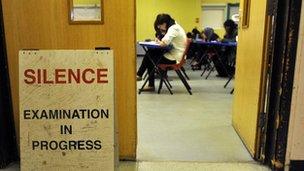Exam grades changed for 45,000 in re-marking
- Published

This summer's GCSE results fell for the first time - but seem to rising again in re-marks
This summer's exam results have seen a 36% increase in re-marking requests.
Exam regulator Ofqual says this has meant changes to more than 45,000 GCSE and A-level grades in England, Wales and Northern Ireland.
There were 275,808 challenges to this summer's exam results - up by more than 100,000 in two years.
Head teachers' leader Brian Lightman, who has campaigned over GCSE English grades, says it shows trust in the exam system is at an "all time low".
An Ofqual spokeswoman said it is "vital that marking is fair and accurate" and that the regulator was considering exam board "practices and processes".
Mr Lightman, general secretary of the Association of School and College Leaders, said the rise in challenges to results was "no surprise" after the unresolved dispute over GCSE English grades.
Exam doubts
Head teachers have claimed that grades were manipulated downwards unfairly - and Mr Lightman said the high numbers of grades now being changed after re-marks confirmed the doubts of head teachers.
But these latest figures from the exam regulator Ofqual show a wider surge in challenges to marking, across both GCSE and A-level.
There were 275,808 challenges to results from summer 2012 - representing almost one in 50 exam scripts.
The GCSE English controversy was about changes to grade boundaries, rather than marking - but English was also the subject that drew the most requests for re-marking.
The number of grades changed has also risen - up by 19% on the previous year.
At GCSE, there were changes to 0.53% of the total number of grades awarded.
This summer saw a small but historic dip in pupils achieving GCSE grades A* to C - down by 0.4% on the previous summer's results.
This was seen as a significant end to year-on-year "grade inflation", but the surge in re-marks and grade changes suggests that this dip might have narrowed.
But the extent of any such reversal remains uncertain, because a small proportion of the changes in grades following re-marks could be downwards rather than upwards.
And upward grade changes above grade C would also not affect the overall proportion achieving the benchmark grades A* to C.
English dispute
The backdrop to the challenges to exam results this summer has been the dispute over GCSE English grades, which is to be subject to a judicial review.
Head teachers have claimed that English grade boundaries were manipulated downwards to ensure that the overall results did not increase - at the expense of individual pupils and their schools.
Mr Lightman says "the administration of that examination led to grossly unfair treatment of young people with potentially disastrous effects on their career opportunities".
Ofqual has rejected claims of unfairness - and produced a report suggesting that there had been over-marking of controlled assessments by teachers.
But head teachers have challenged Ofqual to produce evidence - and had raised the question as to whether the regulator's investigations had ever looked at actual exam papers with evidence of such over-marking.
Ofqual's report included evidence from research interviews with 100 representatives of schools affected by a drop in grades - and a group of head teachers had written to Ofqual requesting transcripts of these interviews.
But Ofqual has told the head teachers that there are no "unpublished transcripts" to release.
Responding to the rise in challenges to results, an Ofqual spokeswoman said: "While there are many external factors that will be driving this, we know that schools are concerned about the quality of marking and we are listening to them.
"It is vital that marking is fair and accurate, especially as we enter a period of significant exams reform, so we are currently conducting a programme of work to look into this area, including exam board practices and processes, and the appeals process itself.
"But it is also is important that we keep these statistics in context. A total of 98% of exam scripts were not subject to any EAR (Enquiries About Results) requests, and just 0.54% of all subject certifications were changed.
"This year there have also been well publicised concerns over GCSE English. Those concerns were around grade boundaries and not the exam board marking."
- Published23 August 2012
- Published7 November 2012
- Published6 November 2012
- Published13 November 2012